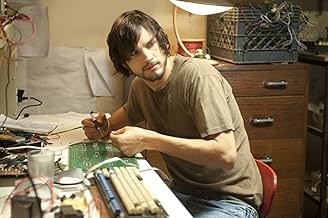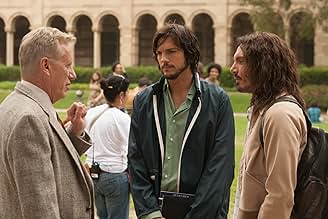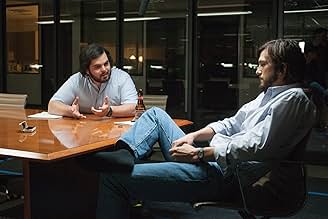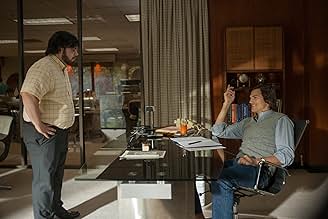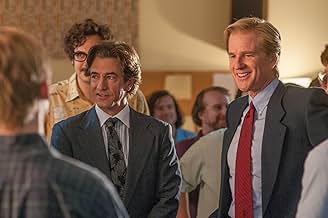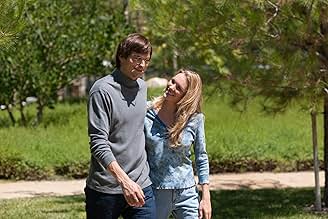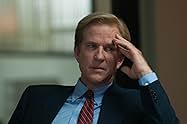A história da ascensão de Steve Jobs, desde o abandono da faculdade até tornar-se um dos empreendedores criativos mais reverenciados do século 20.A história da ascensão de Steve Jobs, desde o abandono da faculdade até tornar-se um dos empreendedores criativos mais reverenciados do século 20.A história da ascensão de Steve Jobs, desde o abandono da faculdade até tornar-se um dos empreendedores criativos mais reverenciados do século 20.
- Prêmios
- 2 indicações no total
Avaliações em destaque
I'm sure Steve Jobs fans have a thousand mistakes they like to point out and a thousand more complaints about his douchie portrayal. I have a more simpler complaint. This is no more than a simple made-for-TV movie. Ashton Kutcher is doing more mimicry than actually taking on the persona. I actually put most of this on the shoulders of director Joshua Michael Stern. There are too many Jobs speeches and pontifications. It's an easy way to copy Steve. Maybe it's too easy. It needs to go deeper.
Developing his imagination for computer programming at Atari, Steve Jobs (Ashton Kutcher) brings in his friend Steve Wozniak (Josh Gad) to help with the hardware aspect, forming a partnership that would soon lead to the founding and development of Apple Computers, a force within the industry throughout the 1980s. Steve is not prepared for the financial demands and the ruthless business mentality, and is eventually forced out of the company he began, only to return in the 1990s with a fresh game plan on how to bring Apple back into the public consciousness, and to dominate the industry once again.
"Jobs" is a biopic with a very narrow focus, and without any sense of risk or adventure. It is so intent on covering Jobs' entire corporate career, that it simply reduces his personal life to a footnote. Stern completely glosses over Jobs' personal life, which is essential to any self-respecting biopic. The entire production feels rushed and slapped together simply to benefit from being the first one out of the gate.
To his credit, Kutcher puts forth a good effort, and he undeniably looks the part of Steve Jobs. Unfortunately, Ashton always looks like he is trying too hard to play the part, and never fully becomes the character he's portraying. His limitations on the big screen prove to be a major liability. He has developed a screen persona as likable character, which has served him well with numerous TV sitcoms. Not so much with movies.
What emerges is a movie that has "a made for TV" feel, which depicts a self-absorbed creep who stabs everyone in the back to simply to get his way that goes on for two plus hours. A thoroughly unsatisfying tribute, and we are still left none the wiser as to what made "The Father of the Digital Revolution" beyond what we already know.
What does this film do well? The first half of it captures the look and feel of early home computing in a totally realistic way - the kind of people who were involved, the way that they dressed, what early homemade personal computers in the 1970s looked like. What did they look like? It was like the first cars when they were called "horseless carriages" because that's what people AND the inventors understood as the old paradigm. The horse was being replaced with an engine and the rest of the car looked like carriages always had looked. So the earliest computers had switches and lights and sat in unattractive blue boxes that engineers thought were great, but the average person had no idea what to do with such a thing and didn't want one.
What did this film do poorly? I'd say Steve Wozniak is presented as a mere shadow of himself here. You never see the camaraderie or dynamic between himself and Jobs. The old Home Brew Club looked up to Wozniak, and when he presents the first "Apple" computer to them they just look bored and Woz looks scared.
Finally I come to Ashton Kutcher. Ashton Kutcher's problem is that he did one of his earliest roles so well and so long - that of mega screw up Kelso in the long running TV comedy "That 70's Show". He did it so well in fact that I ALWAYS see Kelso whenever I see Kutcher, no matter how well he is performing. In this film I kept waiting for his 70's Show girlfriend, alpha female attack dog Jackie, to come jumping out of a dark corner and start yelling at him and tell him what a screw up he is. Kutcher can't help this. I call it "Norman Bates Syndrome" - the same thing that happened to Anthony Perkins. No matter what role Anthony Perkins took after Psycho, no matter how well he did it, he was always Norman Bates. You just kept waiting for him to hit somebody over the head and start preparing the body to add to his collection of stuffed animals/people.
This is not a terrible film on Jobs. Nobody does a bad job, and it is interesting from a history of personal computing perspective. I'd say see this one for the history, and watch the Fassbender rendition in "Steve Jobs" to get a feel for the essence of the man, who will always remain somewhat of an enigma.
Unfortunately, the script isn't strong enough to give us the whole picture of Steve Jobs' remarkable life. As the film traces the rise, the fall, and then the beginning of the resurrection of Apple the computer brand, the focus is divided too much between the company and the man. If you know more about the life of Steve Jobs, you'll be disappointed when you realize you're not getting to see the full arc of his life. The film would have been better off calling itself "Apple", but even then, I would have found it lacking.
This film reminded me of "The Social Network", but without the same level of entertainment in its storytelling. The supporting actors, including Josh Gad as Apple's other founder, Steve Wozniak, Dermot Mulroney, as initial Apple financier and eventual CEO Mike Markkula, and Matthew Modine as John Scully, Markkula's successor as CEO, show the passion that those closest to the company have for Apple, but the film is supposedly about Steve Jobs. While the script does touch on some of Jobs' personal life, it seems much more concerned with the company that he helped start. "Jobs" may give us a measure of the man, but doesn't do the best job at telling his STORY. Doing the best job I can as a reviewer (while still doing my other jobs), I give this one a "B".
Você sabia?
- CuriosidadesAlmost all of the scenes involving Jobs' parents' house and garage were filmed in the actual Los Altos, California house and garage where Steve Jobs grew up in the 1970s.
- Erros de gravaçãoWhen Jobs introduces Apple's new music player he calls it "the iPod". Jobs avoided preceding Apple devices with "the", rationalizing that doing so positioned a product as a representation of a user rather than as an inanimate object. In video of the event Jobs refers to the device as simply "iPod" without any definite or indefinite articles.
- Citações
[last lines]
Steve Jobs: [narrating] Here's to the crazy ones. The misfits, the rebels, the troublemakers, the round pegs in the square holes, the ones who see things differently. They're not fond of rules, and they have no respect for the status quo. You can quote them, disagree with them, glorify or vilify them. About the only thing you can't do is ignore them. Because they change things - they push the human race forward. And while some may see them as the crazy ones, we see genius. Because the people who are crazy enough to think they can change the world, are the ones who do.
[speaking directly]
Steve Jobs: How was that?
- Cenas durante ou pós-créditosThe television advertisement in the film is named: "Iron Eyes Cody: People Start Pollution, People Can Stop It". It's credited as: "Iron Eyes Cody: People Start Pollution, People Can't Stop It".
- ConexõesFeatured in The Tonight Show with Jay Leno: Episode #21.187 (2013)
- Trilhas sonorasPeace Train
Performed by Cat Stevens (as Yusuf / Cat Stevens)
Written by Cat Stevens
Courtesy of Island Records Ltd.
Under license from Universal Music Enterprises
Principais escolhas
Detalhes
- Data de lançamento
- Países de origem
- Centrais de atendimento oficiais
- Idioma
- Também conhecido como
- Jobs: El hombre que revolucionó al mundo
- Locações de filme
- Empresas de produção
- Consulte mais créditos da empresa na IMDbPro
Bilheteria
- Orçamento
- US$ 12.000.000 (estimativa)
- Faturamento bruto nos EUA e Canadá
- US$ 16.131.410
- Fim de semana de estreia nos EUA e Canadá
- US$ 6.713.900
- 18 de ago. de 2013
- Faturamento bruto mundial
- US$ 42.128.352
- Tempo de duração2 horas 8 minutos
- Cor
- Mixagem de som
- Proporção
- 2.35 : 1
Contribua para esta página








